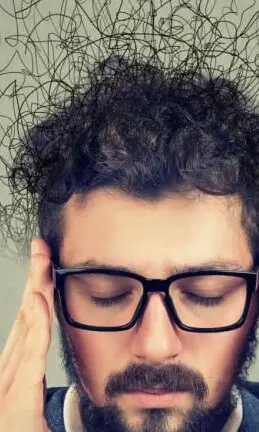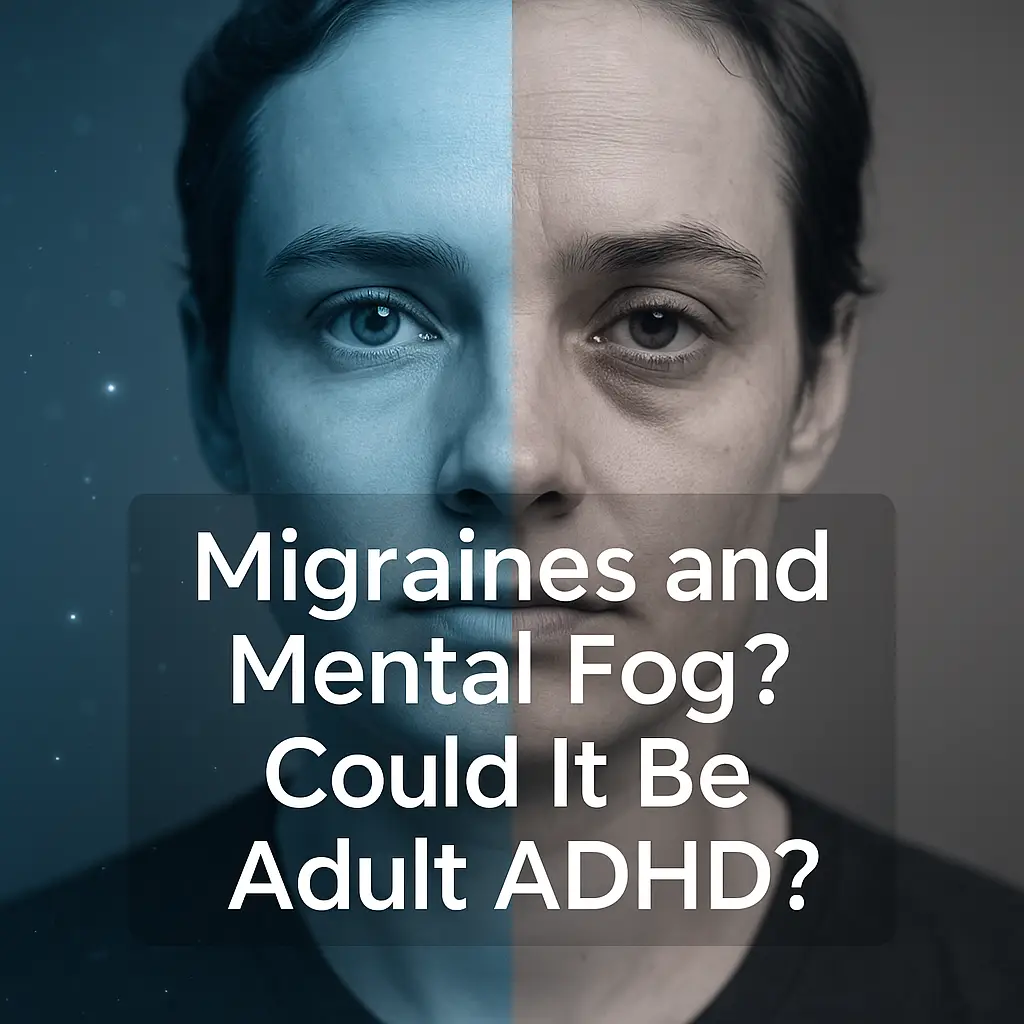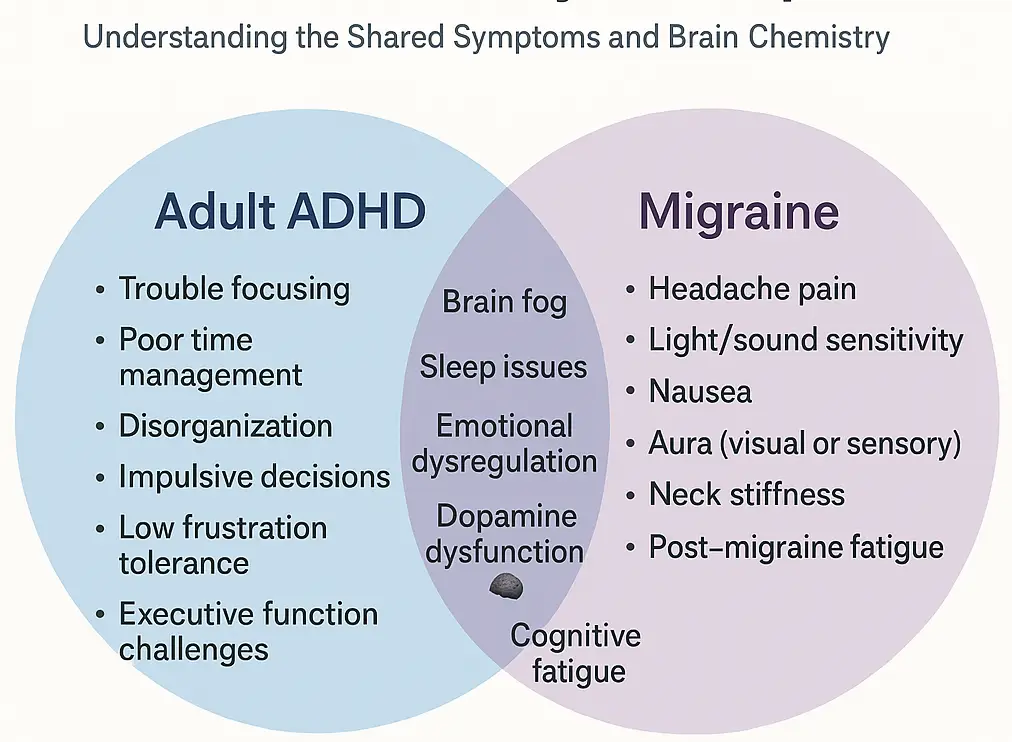Migraines and Mental Fog? It Might Be Undiagnosed Adult ADHD
If you deal with migraines, struggle with focus and memory, feel mentally exhausted, or find it difficult to manage everyday tasks, you may be dealing with more than just stress. These symptoms are often signs of Adult ADHD, a condition that impacts executive function and is frequently overlooked in adults. Research suggests there may be a direct link between Adult ADHD and migraine, especially when both affect how your brain processes pain and attention. With proper neuropsychological testing and support through medication management, many people find lasting relief.
A German study published in the Journal of Attention Disorders found that adults with ADHD are more than twice as likely to suffer from migraines, especially migraine with aura, the kind that begins with flashing lights or tingling sensations. If you’re managing both migraine pain and brain fog, this connection could be the missing piece.

ADHD and Migraine: What’s the Link?
Both conditions involve the brain’s dopamine system, which plays a role in attention, mood, and how we process pain. Disruptions in dopamine may explain why Adult ADHD and migraine often occur together. If you’ve been treating migraines but still feel mentally drained, undiagnosed ADHD might be a contributing factor.
Symptoms That Often Overlap
Here are common signs of Adult ADHD that are often missed, especially when migraine symptoms dominate:
Difficulty focusing or finishing tasks
Struggles with focus and memory
Poor time management and organization
Mental fatigue or overwhelm
Emotional sensitivity or irritability
Sleep disruption or racing thoughts
These issues can impair daily functioning and are frequently misdiagnosed as stress, depression, or anxiety, especially in high-achieving students and professionals. For those experiencing migraines, too, the root cause might lie deeper in executive function challenges.
Why Executive Function Matters
Executive function refers to the brain’s ability to plan, prioritize, and regulate emotions and behavior. In people with Adult ADHD, executive dysfunction is common. When combined with migraine, this can amplify struggles at work, in school, and at home.
You may find it hard to stay on task, meet deadlines, or even remember appointments—all while battling debilitating headaches. Understanding and treating executive dysfunction is key to long-term improvement.
What Is the Role of a Psychiatrist?
If you suspect Adult ADHD or a link between your migraines and mental health, a psychiatrist is the best place to start. Psychiatrists are medical doctors trained to diagnose and treat disorders like ADHD, anxiety, and chronic pain conditions. They take a whole-person approach, considering how various conditions interact.
A psychiatrist will:
Conduct a structured clinical interview and gather medical history
Order or interpret neuropsychological testing to clarify your diagnosis
Identify if your symptoms are due to Adult ADHD, migraine, or both
Offer medication management tailored to your brain chemistry
Coordinate with therapists, neurologists, or primary care physicians as needed
The Role of Neuropsychological Testing
Neuropsychological testing helps uncover patterns in attention, memory, and decision-making. It’s especially useful when symptoms are complex or overlapping, such as when migraine and Adult ADHD coexist.
Testing might include:
Attention and memory assessments
Executive functioning tasks
Problem-solving evaluations
Processing speed and emotional regulation testing
Results guide your psychiatrist in choosing the right treatment plan.
For many adults, seeing a psychiatrist is the first step toward understanding not just why they have migraines, but why they feel chronically unfocused, disorganized, or emotionally overwhelmed.

Treatment Options That Address Both Conditions
Managing Adult ADHD and migraine often requires a multi-pronged approach. Your psychiatrist might recommend:
Medication management with stimulants, non-stimulants, or migraine-safe drugs
Behavioral therapy or ADHD coaching
Sleep and stress management strategies
Tools and apps to improve focus and memory
Coordinated care with neurologists for migraine-specific treatments
The goal is to reduce symptoms from both conditions without making the other worse. For example, some migraine medications may worsen ADHD symptoms, and vice versa. A psychiatrist can help balance both.
Clarity Starts with the Right Diagnosis
If you’ve been struggling with migraines, brain fog, or attention problems, Adult ADHD could be the key to understanding it all. You deserve answers that go beyond pain relief. With help from a psychiatrist, and insights from neuropsychological testing, you can begin a treatment journey that improves both your executive function and quality of life.
Don’t wait until the next migraine or missed deadline to take action.

